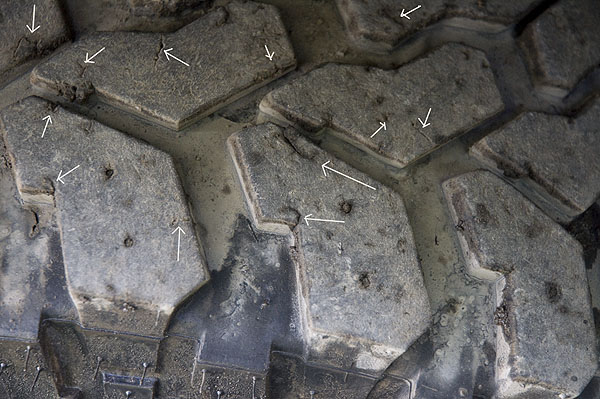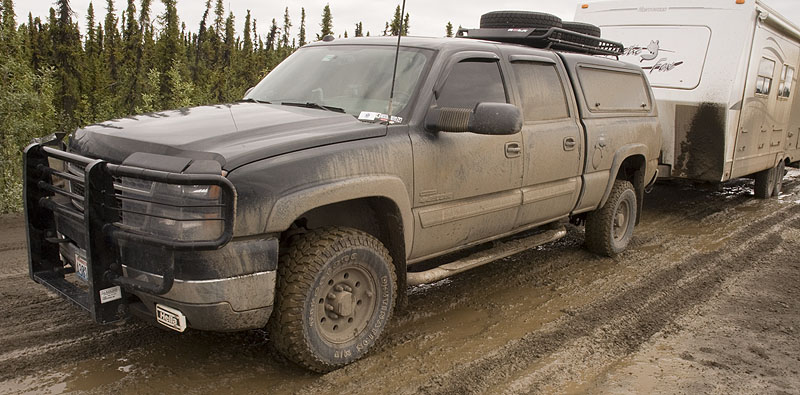Forum Discussion
garryk6
Aug 27, 2013Explorer
SteveRankin wrote:
Good info on the Nitto's on OEM wheels. Thanks. Unfortunately though, only their AT tire is available in that size - not the MT or Mud Grappler. The key difference is in the construction of the sidewall where the 3-ply MT's can take much more abuse than the 2-ply AT's. The 4-ply 19.5's are made even tougher.
About the comments about driving to Alaska, however, we're not talking about the usual RV trip to Alaska. Been there, done that, got a drawer full of T-shirts.
What we're talking about is driving the haul roads in the remote parts of the Arctic - thousands of miles of primitive gravel & mud. Some of it razor sharp shale that shreds tires. We spent many days at less than 20 MPH - some of the hairiest times were at 7-12 MPH going down an 18% grade in mud in 1st & 2nd gears in low range with the tach pegged at 3200+ RPM, or pegging the temp gauge on the Allison climbing 7 Mile Hill in the NWT. Been there, done that too. Got another box of T-shirts.
Since it is common for 1-2 tires to be destroyed on the roads we traveled in 2009, we carried 8 mounted spares. That's simply not possible with a camper, so we're looking at tires that can survive with a very low probability of damage since we can carry 2 spares at most.
Note the Arctic Fox was equipped with the same Firestone Destination MT's as the 2005 Chevy K2500HD. Both were lifted 3.5" and we still drug badly on occasion.wintersun wrote:
The Ram trucks have a rear axle and wheel bearings that are rated for 8900 lbs. so your truck with the camper is well within its capabilities. I upgraded my 17" tires with Nitto 285/70R17 that are rated at 3750 and work with my stock rims.
I could get an additional 700 lbs. in total load capacity at the rear with 19.5 tires but that would mean 4 new rims along with 4 new tires. I decided it was not worth it and to work within the 7500 lb. limit for the rear tires. Flexing and heat are my primary concern and driving in the desert with it 115 degrees and at speeds of 65 MPH is more likely to cause a tire to fail than driving at 55 MPH up in Alaska. I have made 5 trips to Alaska and overall the roads are no worse than what I encounter in California.
If you do change out the rims you do want to be sure that the offset of the rim is exactly the same as that for your factory rims. Spindle loading with wheels that have their center of stress outboard of the designed loading (with factory rims) are a frequent cause of failure with the guys putting oversize rubber on their pickups and they are driving around with nothing in the bed of their trucks.
While I have not driven the haul roads, living in Kodiak, we have some of the worst Shale roads around. We also traveled the Denali highway last summer.

When carrying a heavy load such as a TC in Alaska, 19.5's give me a sense of safety I don't have with E rated tires with the camper. We are currently in Anchorage, and the road from Homer to Anchorage was in the worst shape I have seen it in years. There is road construction fixing some of it, but much of it was really bad, like potholes that swallowed my 19.5's whole... In Alaska the frost-heaves, potholes land slides, snow and ice, and the fact that many roads are still not paved, you can "plan" to go all paved roads, but roads are under construction all the summer long. I too agree that towing vice carrying are two different dynamics, and with our roads I am a true believer in 19.5's.
Just my .02cents....
Garry in AK
About Travel Trailer Group
44,056 PostsLatest Activity: May 04, 2014


